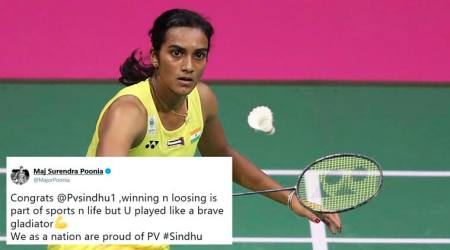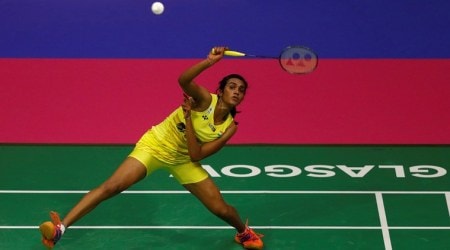 Fantastically agile and blessed with anticipation, Okuhara moves fluidly on the court to pick every shuttle and has devised an overhead spring shot and what’s called in the south of India a ‘jhatka drop’. (Source: Reuters)
Fantastically agile and blessed with anticipation, Okuhara moves fluidly on the court to pick every shuttle and has devised an overhead spring shot and what’s called in the south of India a ‘jhatka drop’. (Source: Reuters)
Nozomi Okuhara and PV Sindhu did not say that their World Championship final was the greatest women’s singles match they’ve played in their careers. Understandable, since they weren’t quite watching themselves play it.
Except for this minority of two, the rest of the badminton world, even 24 hours later, couldn’t recall a more engrossing shuttle spectacle than the one in which Okuhara triumphed in 110 minutes.
Carolina Marin called it an ‘amazing final’, Ratchanok Intanon tweeted this was ‘history making for women’s singles’, Scottish champ Kirsty Gilmour said ‘this has to go down as one of the best matches in history’, while
Badminton Scotland’s chief Anne Smilie declared, “It was an absolute cracker. One that Glasgow will remember for a very long time.”
Jurrit Ruiter, former Danish international lauded the “unreal commitment and fitness” of both players, calling it probably the best “WS” match he had ever seen. Hans Kristin Vittinghuus, Danish Top 20 men’s singles shuttler, tweeted: “We are in the middle of a golden era for women’s singles! So many talented players and today the best WS match in badminton history!”
As things stand, Carolina Marin, Tai Tzu Ying, Nozomi Okuhara, PV Sindhu, Sung Ji Hyun, Akane Yamaguchi alongside the next string of Thais as well as Saina Nehwal are playing enough classics with criss-crossing rivalries and excellent off-court respect for women’s singles to look rosy.
You can nitpick on Sindhu’s stamina and the futile tactics, the desperate attempts to find the second wind, but anyone watching it would tell you she did her darnest to pull this within millimetres of the tape before she lost.
The Emirates Arena was filled to the brim, fans had paid premium money to trudge up north to Glasgow from London to watch this. Of course, some had foolishly paid money to scream ‘Bharat Mata ki Jai’ at the most inopportune moment, right in the middle of a long rally—and their shrieking did coincide with two points Sindhu lost in doomed rallies. But mostly, the two principal characters performed this superhuman task of playing the greatest match, while proving that this is indeed the golden period for women’s singles.

Technical superiority
Okuhara has a gold medal to show for it. But despite coming second-best, here’s why Sindhu ought to remember this one fondly – once the stinging hurt of missing the big title subsides: She drew the absolute best effort out of Okuhara, and gave the world a final that will be remembered for ages. She was up against odds that need listing.
Okuhara is technically a far superior, rounded player. Three wins against Marin, Nehwal and Sindhu make her sound like a metronomic retrieving machine, but her ability to construct points has beaten the collective brains of three of the smartest coaches on the circuit – Fernando Rivas, Vimal Kumar and Gopichand. She pushed all three to predictability in Game 3, and none could do a lot about it.
She is 5’1” – and sense would dictate a bigger stronger opponent can overpower her. But fantastically agile and blessed with anticipation, she moves fluidly on the court to pick every shuttle and has devised an overhead spring shot and what’s called in the south of India a ‘jhatka drop’ to have three Olympic medallists of different hues and ages done in. Sindhu paled in front of her in the sheer number of strokes in her armoury—though Okuhara had been beaten with a looming jump-smash at the Olympics. And finally, the Japanese was not going to go down on endurance or speed, the first is essentially the Japanese base of training and the latter is Okuhara’s improvisation.

Lacking gumption
Sindhu— forget the rankings and the seedings— was not the favourite to win this one, and how close she got makes it her greatest—even above the Olympic thriller where she and Marin touched breakneck speed while pushing the pace on the rallies. It’s why the Indian is a champion whose grit is to be respected, though gumption was lacking.
Sindhu— forget the rankings and the seedings— was not the favourite to win this one, and how close she got makes it her greatest—even above the Olympic thriller where she and Marin touched breakneck speed while pushing the pace on the rallies. It’s why the Indian is a champion whose grit is to be respected, though gumption was lacking.
It was sometime past the 105th minute, with the score reading 19-21, 22-20, 19-20 that PV Sindhu made the 2017 World Championship final the greatest match in women’s singles of a very long time. She would always be half claimant to a titanic battle that had gone past 100 minutes – and falling just one minute short of the longest-ever. But 19-20 behind in the decider of the World Championship final – very tired, a little delirious – Sindhu would have felt her body suffer more than her opponent and not for want of ‘fitness.’ Tiredness swamps a taller athlete faster – it’s a quick spiral down – and it was in those flagging moments that Sindhu played the longsest rallies.

Okuhara held match point at 20-19, and it was then that in a shorter rally, Sindhu would draw once more from dipping reserves to send one down the line, right along the line that she got one in to offer her final resistance.
Frankly, all the long rallies had been blurs for both—someday they’ll watch the replays and make sense of it—and in the middle, it had boiled down to picking the next shuttle. Okuhara, with more options, could think a little better. Sindhu, who was literally struggling to put the punch on her strokes though the arms were whirring, was feverishly labouring.
There are 1000 things that could’ve been done in strategy, but even the fittest bodies will struggle against the mastery of geometry that Okuhara was displaying. It was somewhere in Sindhu’s dogged belief that she could overcome all of this that history got made. Okuhara was built for retrieving—Sindhu did well to compete on the Japanese girl’s terms and still came close.
The solutions were somewhere in the future on the drawing board and in new strokes that’ll be learnt in hours of practice. Sindhu’s greatness lies in moving at Okuhara’s speed —pushing her body to do that— even when her game was following firmly in the slipstream.

